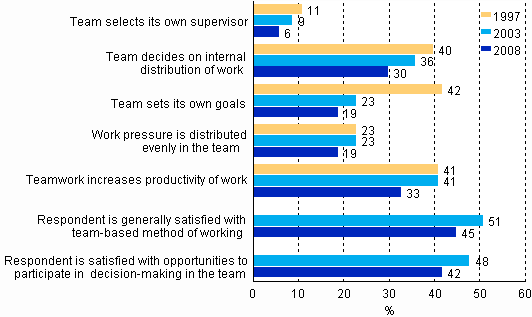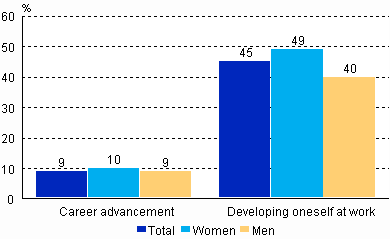Press release 13.8.2009
Teamwork has become increasingly difficult in the 2000s
Working in teams has become increasingly common in Finland in the 2000s. Already two in three wage and salary earners work in permanent working groups or teams. At the same time assessment and rewarding systems emphasising individual performance and competition and mismatched with the principles of teamwork have become common in working life. The prerequisites of successful teamwork are good social relationships, shared goals and the opportunity to exert some influence on the objectives of work. Increasingly few employees are satisfied with working in teams or believe that teamwork increases the productivity of work. The opportunities of teams to have a say in how they work and what their goals are have also decreased markedly.
Aspects of teamwork
"Totally true". Quality of Work Life Surveys 1997, 2003 and
2008

These data derive from the publication "Three decades of working conditions. Results from quality of work life surveys 1977-2008" concerning working conditions in Finland by Statistics Finland's researchers Anna-Maija Lehto and Hanna Sutela which has recently been published in English. The publication looks at data from extensive interview surveys during a period of more than 30 years.
Development at work is important to Finnish people
Quality of work life surveys show that in many respects the past thirty years have also brought positive changes to Finnish working life. Not only are employees increasingly competent, but their opportunities to develop in their work and receive training and education at work have also improved significantly. Tasks have become more varied and independent, and employees' possibilities of influencing different aspects of their work have improved. Employees see their work as important and significant more often than they used to.
Finnish employees appreciate the contents of their work and the opportunities for development provided by their work significantly more than the career advancement possibilities linked with their work. Good social relationships, security and a long-term perspective are also very important aspects of work. Gainful employment is a rather significant part in the life of Finnish employees, and many would like to continue it in some form even after reaching retirement age.
Importance of career development and developing
oneself at work
"Very important". Quality of Work Life Survey 2008

Finland does well in international comparisons as regards low hierarchies in working communities, superior-subordinate discussions, application of IT and frequency of team work. Employees in Finland view their possibilities of developing themselves at work and of receiving training and education and influencing their tasks as better than employees in many other European countries.
Source: Three decades of working conditions.
Results from quality of work life surveys 1977-2008. Statistics
Finland
Orders: Sales Service +358 9 1734 2011, sales@stat.fi
Inquiries: Ms Anna-Maija Lehto +358 9 1734 3223
Director in charge: Ms Riitta Harala
Home page of the Quality of work life survey
